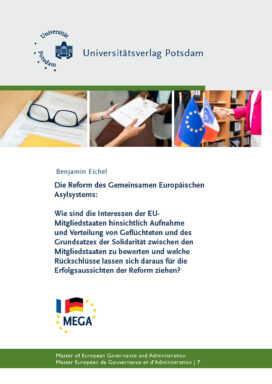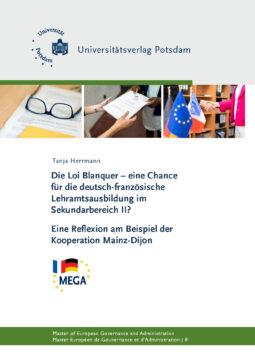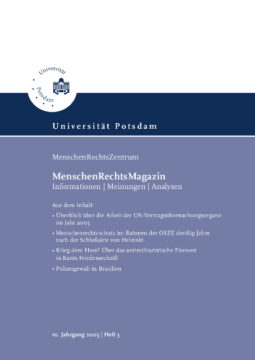The reform of the Common European Asylum System (CEAS) is one of the greatest challenges and one of the most urgent tasks facing the EU and its member states. In this context, the question of “fair burden-sharing” in asylum and migration policy is putting the cohesion of the EU to the test. Since the failed negotiations on the CEAS reform in 2016/2017, the member states have been trying to find a balance between the principles of solidarity and responsibility, as stipulated by Art. 80 TFEU for the CEAS. Depending on the interests at stake, however, the understanding behind this varies greatly.
This paper examines the reform efforts of the CEAS after the presentation of the Commission’s proposals in September 2020 and sheds light on the diverging interests of the Member States with regard to the reception and distribution of refugees. The aim of the work is to make a statement about the chances of success of an agreement on the principles of solidarity and responsibility. To this end, the obligations in asylum law based on international conventions such as the Geneva Refugee Convention are first presented. GEAS and the Dublin system, which assigns responsibility for asylum procedures to the first country of entry, and the reasons for its failure are then analysed.
This division of responsibility, which leads to a disproportionate burden on member states in the South, is a focal point for conflicts, mutual accusations and mistrust between member states. As a result of an actual overload and partly self-inflicted impossibility to fulfil the CEAS obligations, the Southern states call for support from the North and at the same time pursue a policy of laissez-passer. Partly catastrophic conditions in the procedures, accommodation and care of refugees create obstacles to repatriation and pressure on the destination states to provide more solidarity.
Based on this finding, the meaning of the principle of solidarity in Article 80 TFEU is examined from a normative and descriptive perspective. Normatively, it is an abstract legal obligation to provide mutual support, the form of which is left to the political discretion of the Member States. Descriptively, “solidarity” can be understood as the purpose that the realisation of individual interests requires a collective effort, which in turn promotes the common good and is thus in the interest of all. Following this, all member states would have to have an interest in addressing the challenges of migration to Europe.
However, the interests of the member states indicate otherwise. The Mediterranean countries such as Greece and Italy, which are heavily burdened by the arrivals of protection seekers from the south, are demanding a departure from the Dublin system. The Visegrád states, which are critical of migration, are basically refusing to provide any support in terms of reception, citing that they are fulfilling their legal obligations. States that for a long time pursued a liberal migration policy and were popular destination countries, such as Sweden, are wrestling with themselves after the migration crisis of 2015/2016 in search of a migration policy course that will not allow right-wing populist forces to grow even stronger. The main target countries, Germany and France, are also trying to prevent secondary migration in line with their respective domestic political discourses and want to support the external border countries in different ways, with Germany supporting the redistribution of all.
The Commission’s proposals presented in September 2020 attempt to accommodate the different interests. By creating a border procedure, the number of refugees entering the EU and having to be relocated should be reduced. By amending the Dublin criteria, the responsibility of potential countries of destination is to be expanded in order to relieve southern countries and counter secondary migration. With the same goal in mind, a new solidarity mechanism should be used to relocate unaccompanied minors and those rescued from distress at sea. In times of crisis, this should result in a general relocation of all those seeking protection, whereby solidarity can continue to be provided in various ways.
In view of the negotiations during the German EU Council Presidency and the interim result achieved, there is scepticism that the member states will soon agree on a CEAS reform. The interests of the member states are too far apart for this, also with regard to solidarity. In addition, the question arises, which is worrying with regard to European integration and the future of the EU, as to what the common good in asylum policy, which is in the interest of all, is supposed to be, which turns the joint effort into an individual interest of each individual. For unlike the creation of the Schengen area as an area without internal borders, no gains in prosperity are to be expected from the admission of refugees for the time being.





